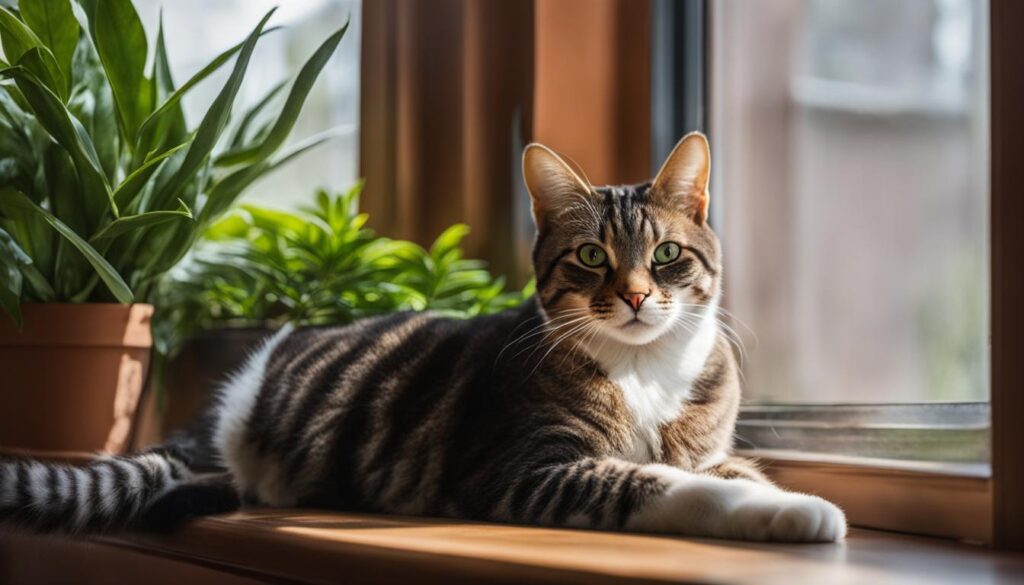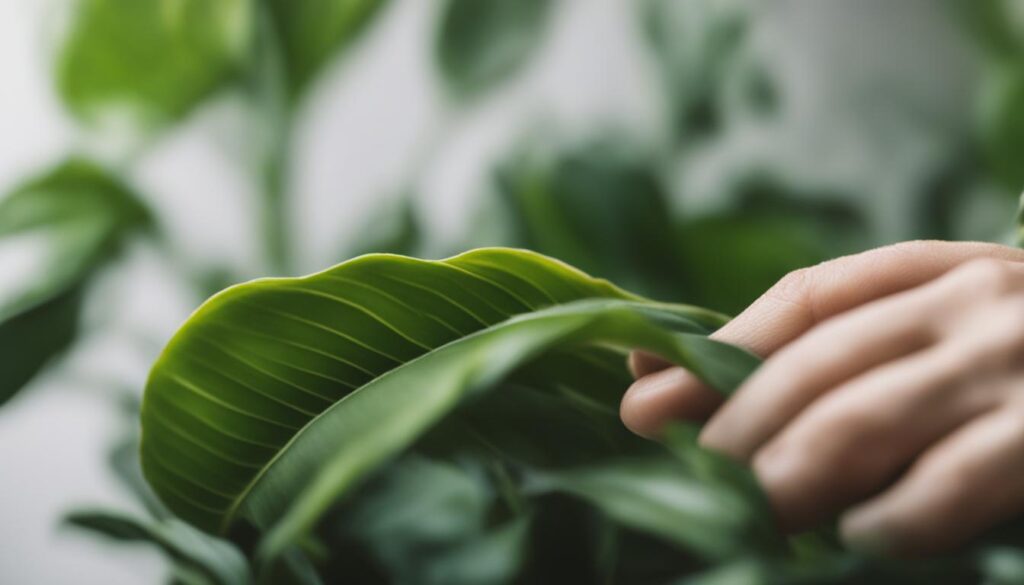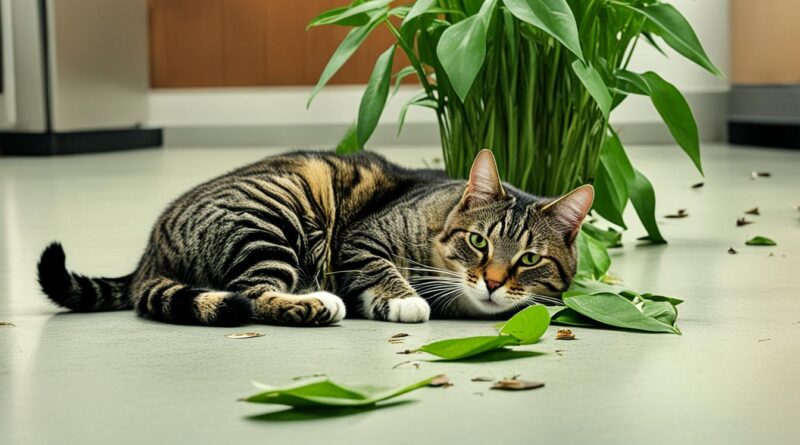Is Your ZZ Plant Safe for Cats? The Truth Revealed.
Are you a proud plant parent and a cat lover? If so, you may be wondering if your beloved ZZ plant poses a threat to your furry friend. The truth is, while the ZZ plant, scientifically known as Zamioculcas zamiifolia, is mildly toxic to cats, there’s no need to panic. With some precautions, you can safely enjoy this beautiful plant in your pet-friendly home.
Key Takeaways
- The ZZ plant, also known as Zamioculcas zamiifolia, is mildly toxic to cats if ingested.
- The plant’s sap contains calcium oxalate crystals, which can cause oral irritation and gastrointestinal upset in cats.
- However, the risks of ZZ plant poisoning in cats are relatively low when proper precautions are taken.
- Keep the ZZ plant out of your cat’s reach and consider pet-friendly alternatives for added peace of mind.
- Remember to always research the toxicity of plants before introducing them into your home to ensure the safety of your furry friend.
The Appeal of the ZZ Plant: Why It’s So Popular
The ZZ plant, also known as Zamioculcas zamiifolia, has become a favorite among plant enthusiasts for several reasons. Its unique characteristics and numerous benefits make it an attractive choice for both experienced and novice plant owners.
Mesmerizing Leaf Patterns
One of the main reasons for the ZZ plant’s popularity is its mesmerizing leaf patterns. The glossy, dark green leaves have an eye-catching appearance that adds a touch of elegance to any living space. Whether it’s the rich green color or the distinctive zigzagging shape of the leaves, the ZZ plant never fails to captivate onlookers.

Air-Purifying Abilities
In addition to its aesthetic appeal, the ZZ plant is known for its air-purifying abilities. Like many other plants, it has the capacity to remove harmful toxins from the air, improving the overall indoor air quality. This makes it a valuable addition to any home, particularly for individuals concerned about feline health and the well-being of their pets.
Low Maintenance Requirements
The ZZ plant is highly regarded for its resilience and low maintenance requirements, making it an ideal choice for busy individuals or those who lack a green thumb. It can thrive in a wide range of light conditions, from low light to indirect sunlight, and it requires infrequent watering. This inherent adaptability and minimal care needs make it an excellent choice for both pet owners and plant lovers.
“The ZZ plant brings a touch of elegance to any living space and offers the added benefits of air purification and low maintenance requirements.”
Despite the potential risks associated with the ZZ plant and feline health, many individuals still choose to include it in their indoor plant collection. The allure of its beautiful foliage, combined with its air-purifying abilities and minimal care needs, make it a popular choice for those seeking a visually appealing and pet-friendly houseplant.
Understanding ZZ Plant Toxicity
The ZZ plant, scientifically known as Zamioculcas zamiifolia, is often surrounded by debates regarding its toxicity to cats. Let’s uncover the truth behind these claims and gain a better understanding of the potential risks involved.
Contrary to popular belief, the ZZ plant is mildly poisonous rather than highly toxic. It contains calcium oxalate crystals in its sap, which act as irritants when ingested by cats, dogs, or humans. However, claims suggesting severe toxicity have been exaggerated and lack scientific evidence to support them.
While the ZZ plant may not pose a significant threat, it’s crucial to be aware of the possible symptoms associated with ZZ plant poisoning in cats and dogs. These symptoms may include oral irritation and gastrointestinal upset.
To gain further insight into the potential dangers of the ZZ plant, it is beneficial to consult a licensed veterinarian, who can offer professional advice tailored to your pet’s specific needs.
Although the ZZ plant is not highly toxic to cats, it’s important to prioritize your pet’s safety. By understanding the risks and taking necessary precautions, you can create a secure environment for your feline companion.
The Importance of Pet-safe Plant Selection
When choosing plants for your home or garden, it’s essential to consider their suitability for the well-being of your pets. Some plants, including certain species of lilies, amaryllis, and azaleas, are highly toxic to cats and should be avoided. However, the ZZ plant falls into the category of mildly toxic plants.
To help you navigate the world of pet-safe plants, here’s a list of common household plants that are considered safe for cats:
| Plant Name | Botanical Name |
|---|---|
| Spider Plant | Chlorophytum comosum |
| Areca Palm | Dypsis lutescens |
| Boston Fern | Nephrolepis exaltata |
| Money Tree | Pachira aquatica |
| Parlor Palm | Chamaedorea elegans |
Incorporating these cat-friendly plants into your living spaces can provide your feline friend with a visually appealing environment while minimizing the risk of accidental poisoning.

Remember, the well-being of your pets should always be a top priority. By understanding the true level of toxicity associated with plants like the ZZ plant and making informed choices, you can create a harmonious and safe home for your beloved feline companions.
Symptoms and Treatment of ZZ Plant Poisoning
Ingesting or coming into contact with the ZZ plant can cause various symptoms in cats, including oral pain, decreased appetite, drooling, and vomiting. If you suspect your cat has been exposed to the ZZ plant, it’s important to seek immediate veterinary advice. Treating ZZ plant exposure involves removing any plant material from the mouth, providing water, and monitoring the cat’s condition.
Cats are curious creatures that may come into contact with plants while exploring their surroundings. Although the ZZ plant poses a mild risk, being aware of the potential symptoms of ZZ plant poisoning can help you identify any issues early on.
Common Symptoms of ZZ Plant Poisoning:
- Oral pain and irritation
- Decreased appetite
- Drooling
- Vomiting
If you notice any of these symptoms in your cat, it’s important to act promptly. Contact your veterinarian for guidance and let them know about the potential ZZ plant exposure. They will be able to assess the severity of the situation and provide the necessary treatment.
During your visit to the veterinarian, they may perform a thorough examination of your cat to determine the extent of the poisoning. They may also recommend additional tests or procedures if needed.
The treatment for ZZ plant poisoning typically involves removing any plant material from the cat’s mouth to prevent further ingestion. Your veterinarian may also provide supportive care, such as administering fluids to prevent dehydration. They will closely monitor your cat’s condition and recommend any additional steps necessary for a full recovery.
Remember, prevention is key when it comes to your cat’s safety. While the ZZ plant may not pose a significant threat, it’s essential to create a cat-friendly environment by ensuring they have access to safe plants for cats and engaging toys that can help divert their attention from potentially harmful plants.
Preventing ZZ Plant Poisoning in Cats
To keep your feline friend safe and healthy, it’s crucial to take precautionary measures when it comes to ZZ plants and other potentially toxic houseplants. Here are some simple steps you can follow to ensure your cat’s well-being:
1. Place the plant out of reach
One of the easiest ways to prevent ZZ plant poisoning is by keeping the plant in an area that is inaccessible to your cat. Consider placing it on a high shelf, securely hanging it from the ceiling, or using plant stands or hangers to elevate it out of reach.
2. Opt for cat-friendly alternatives
Instead of having toxic plants like ZZ plant in your home, opt for cat-friendly plants that are non-toxic or have minimal toxicity. Some examples include spider plants, Boston ferns, and African violets. These plants not only provide a safe environment for your cat but can also enhance the aesthetics of your space.
3. Research the toxicity of plants
Before bringing any new plants into your home, make sure to research their toxicity levels. Understanding which plants are harmful to cats can help you make informed decisions about the types of plants to avoid. Stay up to date with the latest recommendations from reputable sources such as the ASPCA’s list of plants toxic to pets.
4. Provide safe plants and engaging toys
Give your cat safe, cat-friendly plants to nibble on or explore. Cat grass, wheatgrass, or catnip can provide a safe alternative for cats who enjoy chewing on foliage. Additionally, ensure your cat has plenty of engaging toys and scratching posts to redirect their attention away from potentially harmful plants.
By following these preventive measures, you can create a safe and cat-friendly environment in your home while still enjoying the beauty and benefits of indoor greenery.
Conclusion
In conclusion, the ZZ plant, also known as Zamioculcas zamiifolia, poses a mild toxicity risk to cats if ingested. However, the likelihood of poisoning is low as long as pet owners practice responsible care and take necessary precautions. By keeping the ZZ plant out of reach and providing safe alternatives, pet-friendly houseplants can still be enjoyed without compromising the safety and well-being of our feline companions.
It’s important to be aware of the potential risks associated with zamioculcas zamiifolia toxicity to cats and take appropriate measures. While the ZZ plant may not be the most ideal choice for households with cats, there are plenty of other pet-friendly houseplants available. Researching the toxicity of plants before bringing them into our homes can help ensure a pet-safe environment.
Remember, the love and care we provide to our pets extend to every aspect of their lives, including the plants we have at home. By making informed decisions and choosing pet-friendly options, we can create an environment that promotes their health and happiness.
FAQ
Is the ZZ plant toxic to cats?
Yes, the ZZ plant is mildly toxic to cats if ingested.
What makes the ZZ plant toxic to cats?
The calcium oxalate crystals in the plant’s sap are responsible for its toxicity.
Are there any risks associated with the ZZ plant?
The risks associated with the ZZ plant have been blown out of proportion. With proper precautions, the ZZ plant can be safely kept in your home.
What are the symptoms of ZZ plant poisoning in cats?
Symptoms may include oral pain, decreased appetite, drooling, and vomiting.
What should I do if my cat ingests the ZZ plant?
Seek immediate veterinary advice and remove any plant material from the mouth. Monitor your cat’s condition and provide water.
How can I keep my cat safe from ZZ plant poisoning?
Place the plant out of reach, opt for pet-friendly alternatives, and research the toxicity of plants before bringing them into your home. Provide safe plants and engaging toys for your cat to divert their attention.


